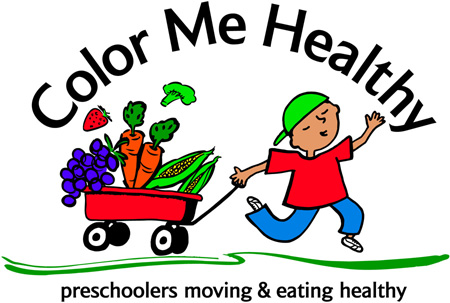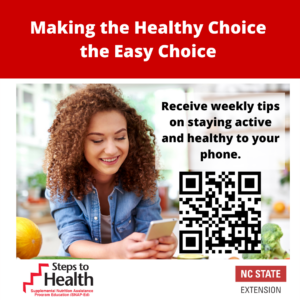Color Me Healthy (PreK)
go.ncsu.edu/readext?251591
en Español / em Português
El inglés es el idioma de control de esta página. En la medida en que haya algún conflicto entre la traducción al inglés y la traducción, el inglés prevalece.
Al hacer clic en el enlace de traducción se activa un servicio de traducción gratuito para convertir la página al español. Al igual que con cualquier traducción por Internet, la conversión no es sensible al contexto y puede que no traduzca el texto en su significado original. NC State Extension no garantiza la exactitud del texto traducido. Por favor, tenga en cuenta que algunas aplicaciones y/o servicios pueden no funcionar como se espera cuando se traducen.
Português
Inglês é o idioma de controle desta página. Na medida que haja algum conflito entre o texto original em Inglês e a tradução, o Inglês prevalece.
Ao clicar no link de tradução, um serviço gratuito de tradução será ativado para converter a página para o Português. Como em qualquer tradução pela internet, a conversão não é sensivel ao contexto e pode não ocorrer a tradução para o significado orginal. O serviço de Extensão da Carolina do Norte (NC State Extension) não garante a exatidão do texto traduzido. Por favor, observe que algumas funções ou serviços podem não funcionar como esperado após a tradução.
English
English is the controlling language of this page. To the extent there is any conflict between the English text and the translation, English controls.
Clicking on the translation link activates a free translation service to convert the page to Spanish. As with any Internet translation, the conversion is not context-sensitive and may not translate the text to its original meaning. NC State Extension does not guarantee the accuracy of the translated text. Please note that some applications and/or services may not function as expected when translated.
Collapse ▲Partnering with Schools
Schools can be a promising place for change. Children are young enough to learn and form new habits; they eat meals and snacks at schools on weekdays; schools are full of role models and mentors for children; and schools generally have spaces designated for physical activity.
Layering
Taken together, education, PSE, and social marketing changes are more effective than any of these strategies alone for improving health and preventing obesity.
Direct Education
 Steps to Health Color Me Healthy serves preschoolers and kindergarteners across North Carolina in schools, Head Start, and Child Care Centers.
Steps to Health Color Me Healthy serves preschoolers and kindergarteners across North Carolina in schools, Head Start, and Child Care Centers.
Color Me Healthy is a nutrition and physical activity program for children ages four and five. It is designed to stimulate all the senses of young children: touch, smell, sight, sound, and of course, taste. It uses color, music, and exploration of the senses to teach children that healthy eating and physical activity are fun.
Steps to Health Color Me Healthy is comprised of nine lessons chosen from the Color Me Healthy curriculum. Taste tests have been added to coincide with each lesson in order to enhance the multi-sensory learning experience. Parent handouts were enriched to contain nutrition tips, family physical activity suggestions, reading book recommendations, and grocery store adventures. All participants are awarded a certificate of participation at the completion of the program. Evaluation of the program is conducted via parent and teacher feedback forms.
- Before Your Program
- Steps to Health Program Request Form (complete a form for EACH program)
- Please click the link above to find our Steps to Health Program Request Form. After completing this form, please give our team members at least 2 weeks to process your information and input your data into our database. Within this time, you will be sent resources you requested and contacted about starting up a new program with Steps to Health. You will be emailed your program I.D. Number and specific links to use to teach your program virtually or to enter your hardcopy Rosters, Surveys and Feedback Forms. Kindly note that program request forms must be filled out for any single program you are conducting at a site.
- Site Eligibility – In order to qualify for Steps to Health programming, schools must participate in the National School Lunch or Breakfast Program. The school building must have at least 50% of students receiving a free or reduced meal. Before beginning programming, use this spreadsheet to confirm that a school qualifies: Steps to Health Eligible Schools. For questions on determining school eligibility, contact sth-administration@ncsu.edu. For virtual surveys and data related information, please contact STH-DataManager@ncsu.com
- Steps to Health Program Request Form (complete a form for EACH program)
- Resources
- Color Me Healthy Participation Letter
- FY 24 Youth Consent Form
- Teacher Agreement
- Attendance Form
- CMH Schedule Template
- Educator Feedback
- Teacher Feedback
- Certificate Template
- Certificate Template with Extra Signature Line
- Certificate Template with Fruits and Vegetables
- Supplemental Activity: My Garden Worksheet
- REACH – Motivate and celebrate ECE programs’ nutrition and physical activity quality improvement with REACH! REACH (Recognizing ECE’s Advancing Children’s Healthy Habits) is a statewide pilot to publicly recognize ECE programs that go “above and beyond” to support children’s health and healthy habits. ECE programs are eligible for REACH recognition when they meet key Go NAPSACC evidence-based practices in one or more of the following areas: Child Nutrition, Farm to ECE, Oral Health, Physical Activity, Outdoor Play & Learning, and Screen Time. Recognized programs receive signage, marketing materials, a profile on the REACH website, mentions on social media and other public recognition. To learn more, go to https://reach-recognition.org/
reach-recognition - For virtual surveys and data-related information, please contact STH-DataManager@ncsu.com
Policy, Systems, and Environmental Change (PSE)
PSE initiatives are based on many factors that influence what people eat and how they choose to be active. From access to healthy food to the walkability of communities, people adopt certain heath behaviors for a variety of reasons.
The ABC’s of a Healthy School Environment is
Steps to Health’s PSE toolkit for schools can be a great tool for partnering with schools to make create a healthier school environment.
Communities Moving Together: A Guide to Facilitating Community-Led Walk Audits
Walk audits can be a powerful tool for identifying both assets and needs within a community’s built environment, but also for bringing community members together around a shared vision. You might also use a walk audit to build on momentum from PSE work done at the organizational level to expand on changes to the built environment within the broader community.
This guide helps communities to assess and enhance their physical environment in places where people live, work, learn, pray, and play, by facilitating community-led walk audits.
In addition to the guide, Steps to Health and Faithful Families developed a series of video modules to highlight steps to planning community-led walk audits. These videos can be utilized to assist local organizations in planning and conducting community-led walk audits to assess the physical environment, walkability, and to increase safety. Additionally, community partners and leaders share successes from their own experiences, demonstrating the positive impacts that walk audits can bring to communities.
Social Marketing

Do you want to continue to encourage teachers, parents, and caregivers to make the healthy choice year round? The Steps to Health text message campaign continues engagement with these groups! To implement this in your community:
- Build internal support. This could be a teacher you already work closely with or the School Health Advisory Committee.
- Market with your supporting partners. This could be done by sending students home with a contact card for their parents or sharing digitally through social media and newsletters.
- If you would like to report how many people in your county signed up as a result of your efforts, email sth-socialmarketing@ncsu.edu.
Additional Resources
Already using this toolkit or partnering with schools? Here are some additional resources you may need:


